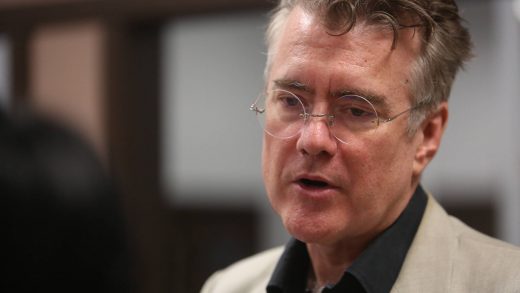
Damien Grant is an Auckland business owner and a regular opinion contributor for Stuff, writing from a libertarian perspective.
OPINION: “Do you stand by the contents of this letter?” the Crown prosecutor asked, handing up some inflammatory bit of correspondence I had sent in my capacity as a receiver of a long-forgotten, failed goat farm.
I squinted at the document, taking a moment to marvel at the delightful prose, before handing it back. “No.”
The prosecuting lawyer stumbled. That wasn’t in the script. I was a Crown witness. Surely it was my responsibility to play along?
READ MORE:
* High-profile Crown prosecutor concealed meeting with secret witness in murder case
* Supreme Court to hear controversial murder conviction
* Man controversially convicted of murder to be released from prison
“Why?” the poor fellow babbled, scrabbling amongst his notes as if the answer lay in the squall of paperwork before him. “What is the difference between when you wrote this letter and your evidence here today?”
I am paraphrasing. The trial commenced in August 2016 and collapsed, for reasons that I will get to, in May 2017. I am forced to rely on the judgement dismissing the case to ensure some resemblance of accuracy. Back to the story.
“Well, today I am under oath.”
LAWRENCE SMITH/Stuff
Alan Hall on the steps of the Supreme Court, where his conviction for murder was finally quashed.
The letter, you see, was a bluff. A flim-flam to tell a story and force a favourable settlement of a commercial dispute. It is possible that the claims being made in it were true. I suspect that they were, but suspicion and knowledge are not the same, and no man’s freedom should hang on the balance of my unfounded hunch.
And the Crown knew this. They had provided me with a “will say” statement, the words they wanted me to utter on the stand and I had responded, in the pre-trial phase, with a notation: “This entire letter was a bluff.”
In another part of this initial brief I had written that there was “no basis for this”, in reference to some claim the prosecutor wished me to assert.
And yet the Crown persisted in both presenting this misleading material to the court and failing to disclose to the defence my initial statements. It was appalling misconduct, in my view, and one from which no consequences flowed.
In declaring a mistrial the judge wrote: “In the circumstances, I cannot rule out the real possibility that the defence may have been able to advance its case through cross-examination of Mr Grant about the statements he wrote on his draft brief of evidence.”
I was recalling this episode as I read the report into the failings of the Crown case against Alan Hall for the 1985 murder of Arthur Easton.
Hall spent 19 years in prison and his convictions were quashed by the Supreme Court last year. A central aspect of this injustice was that one key witness described the killer as being Māori. Hall is Pakeha.
When confronted on how certain he was, the witness responded that he was 100% sure. The police and the prosecuting lawyers felt the witness couldn’t be so certain, given the nature of the observation, but here is where their case eventually fell apart; they didn’t disclose this evidence to the defence and the witness read out a sanitised statement that tilted the evidence.
There were other serious failures in the way this case was handled. The Crown, to put it in lay language, cheated.
Last year the Solicitor-General asked lawyer Nicolette Levy KC to review the actions of Crown lawyers. Her report, or parts of it, is now online.
LAWRENCE SMITH/Stuff
Investigator Tim McKinnel who, Damien Grant argues, has stepped in to save innocent people when Crown Law has failed to do its job properly.
In her response to the question, “what involvement, if any, did any Crown lawyers have in matters which the Supreme Court has said constituted a miscarriage of justice?” are four redacted paragraphs – itself a miscarriage of justice.
The public is entitled to know the KC’s view. It is unacceptable that we do not. It is possible – I would say it is probable – that we have a systematic problem in the mindset of those tasked with representing the Crown in criminal trials.
The public, including witnesses and juries, trust the authorities. Few come to the task of providing evidence with my own background and perspective, and the default human setting is to defer to those in power. This gives the state both an added advantage in litigation and a corresponding responsibility.
In 1753, Sir William Blackstone, lawyer, judge and occasional Tory MP, used his quill to write: “…all presumptive evidence of felony should be admitted cautiously, for the law holds that it is better that 10 guilty persons escape than that one innocent suffer”.
This has become known as Blackstone’s Ratio and comes with its own Wikipedia entry. As far as principles go, it is an admirable one, but mark Blackstone’s words: “all presumptive evidence of felony should be admitted cautiously”.
Stuff
Damien Grant: When the police and the lawyers who pursue the matters in court violate even this right, the role of the courts become little more than an arm of the police.
The accused is entitled to a presumption of innocence and a fair trial. The reality is often different. The Crown has nearly limitless resources, and the harried and under-resourced public defenders and those toiling under the parsimonious legal-aid restrictions are up against a leviathan.
There are few restrictions on prosecutors, but one of the most important is the obligation of disclosure. The accused is entitled to know all the evidence that the state has against them.
When the police and the lawyers who pursue the matters in court violate even this right, the role of the courts becomes little more than an arm of the police.
The final defence of an innocent man should not rely on the tenacity and courage of investigator Tim McKinnel, journalist Mike Wesley-Smith, and the few honourable lawyers in Crown Law willing to eventually step up to their responsibility.
There is a joke told amongst prosecutors that it takes a good lawyer to convict a guilty man, but a great one to convict an innocent one. It would be funny if it wasn’t for cases like Hall, Teina Pora, David Dougherty; and these are the ones we know for certain.
The task of a prosecutor is to objectively present the evidence before court and allow justice to emerge. If those private firms who enjoy the privilege of holding the Crown warrant cannot meet these standards, the Solicitor General should step up to her responsibility, and terminate the contract.


